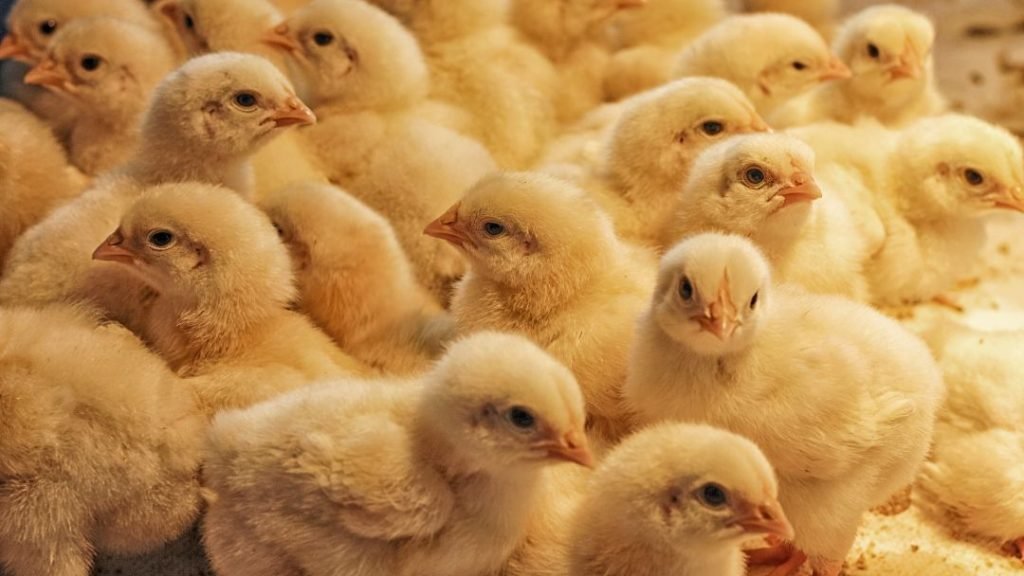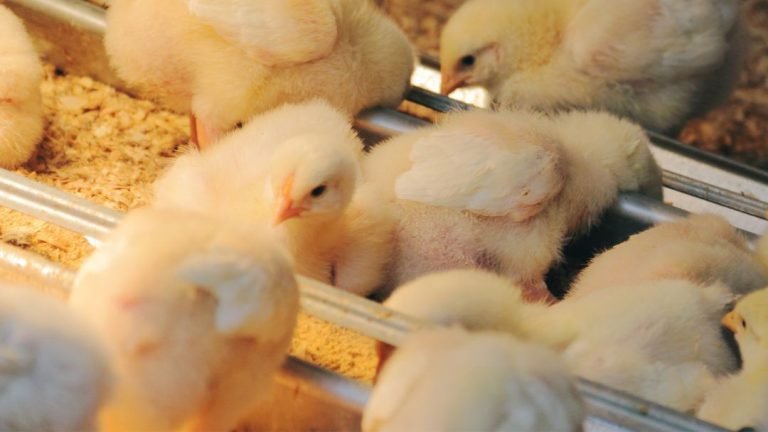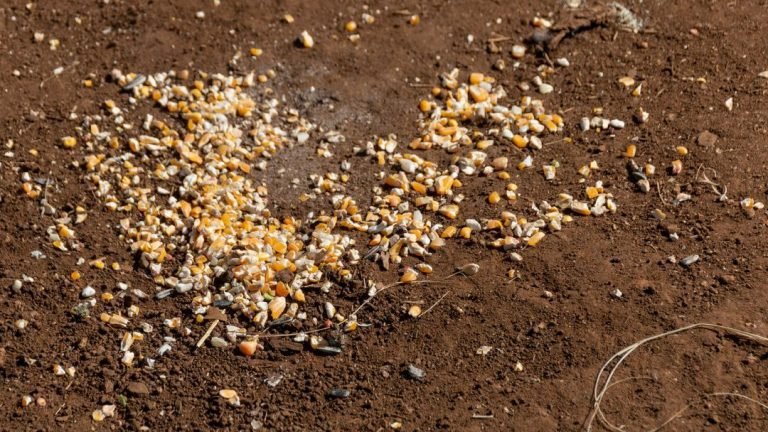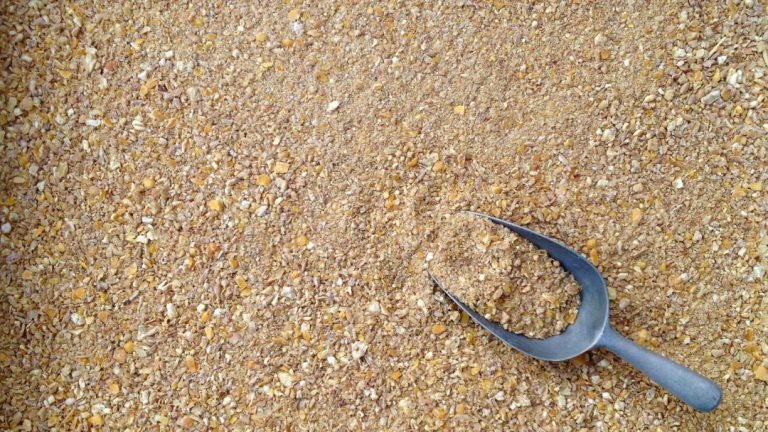Starter feed is essential for baby chicks as it contains 20% to 22% of protein and other beneficial nutrients. But knowing how much starter feed per chick to feed is essential. It should be neither too high nor too low.
On average, a baby chick needs around 25 to 45 grams of starter feed. It can be more or less depending on weight, size, breed type, activity level, environment temperatures, and other aspects. You should not overfeed or underfeed them.
How Much Starter Feed Per Chick?
The average amount of starter feed per chick can be around 25 to 45 grams.
Older baby chicks will consume more starter feed than younger ones.
Younger chickens don’t overeat at a time. They eat several times a day but in small quantities.
For example, baby chicks can eat finely-milled chick starter feed 5 to 6 times a day.
They will only eat 5-10 grams of feed each time.
There should be at least 2 hours of break between each meal. Younger chickens usually drink three times regardless of their meal.
The following table shows how much baby chick eats, depending on their age and weight.
| Week | Age | Chicks’ Average Weight | Grams of Starter Feed per Day |
|---|---|---|---|
| 0 | 0-7 days | 25-50 g | 3-5 g |
| 1 | 1-2 weeks | 50-100 g | 10-15 g |
| 2 | 2-3 weeks | 100-200 g | 20-30 g |
| 3 | 3-4 weeks | 200-300 g | 30-40 g |
| 4 | 4-5 weeks | 300-500 g | 40-50 g |
| 5 | 5-6 weeks | 500-700 g | 50-60 g |
| 6 | 6-7 weeks | 700-900 g | 60-70 g |
| 7 | 7-8 weeks | 900-1100 g | 70-80 g |
| 8 | 8-9 weeks | 1100-1300 g | Transition to Grower Feed |

What Factors Affect How many starters Feed Baby Chicks Should Eat?
Not all baby chicks need the same level of starter feed. The ideal amount will vary depending on various factors.
01. Age And Size Of The Chick
Larger and older baby chicks will need more starter feed than baby chicks.
As mentioned in the table, a baby chick of 0-7 days will need only 3 to 5 grams of starter feed.
On the contrary, a younger chicken of 7-8 weeks can eat up to 70-80 grams of starter feed.
02. Breed Of Chick
Some chicken breeds eat more than others. Leghorn, Belgian, Cochin, Sebright, Silkie, etc., are smaller breeds. They don’t eat as much as larger breeds.
Jersey Giant, Brahma, Cochin, etc., are heavier breeds. These types of breeds eat more than smaller breeds.
They have larger body sizes and require more energy to maintain their weight.
03. Activity Level
Chickens lose their energy through physical activities. Some baby chicks are more active than others.
They usually wander around in different areas and explore different types of things as a part of curiosity.
Continuous movements lead to calorie burn. They will need more starter feed than younger chicks that are sedentary.
Chicks with a decent muscle mass may also require more feed to maintain their energy levels.
04. Environmental Temperature
Baby chicks will eat more than average during the colder months to stay warm.
Their bodies must work harder to maintain their temperature in cold weather.
When temperatures drop, chickens must use more energy to keep themselves warm, which increases their metabolism and caloric needs.
If hens hatched eggs from November to March, provide enough starter feed.
Is Overfeeding Of Starter Feed Bad For Baby Chicks?
Overeating starter feed leads to different types of problems in baby chicks.
01. Kidney Failure
Starter feed contains around 20% to 22% of protein.
Consumption of excessive protein can affect the health of baby chicks negatively.
It may lead to kidney failure from several weeks of overfeeding.
Besides, younger chickens may experience problems with their liver.
02. Digestive Problems
Baby chicks don’t have a stable digestive system like adult chickens.
Overeating starter feed will force them to drink an excessive amount of water. It will lead to loose bowels.
Besides, they may face various digestive problems, such as diarrhea.
It can cause dehydration, malnutrition, and even death if left untreated.
03. Nutrient Imbalances
Both over-eating and under-eating can cause nutrient imbalances and deficiency.
It will result in poor growth and development due to the lack of proper balance of nutrients needed for healthy growth.
Baby chicks may catch different types of health problems from their early stage of life.
Their stomach expands from overeating. Excessive food consumption makes them tired, sluggish, drowsy, or uncomfortable.
04. Obesity
Excessive intake of starter feed may lead to overweight gain. Baby chicks will develop obesity.
The extra calories are stored in the body as fat. This increased body fatness makes them heavier than regular baby chicks.
Younger chickens will be less active and fit. They will move less and prefer to stay in a place.
Excessive obesity may lead to shortness of breath or other breathing difficulties.
In some cases, it may cause chronic heart disease, debilitating chronic pain, etc.
How To Avoid Overfeeding Of Starter Feed To Baby Chicks?
Most baby chicks don’t eat too much starter feed. They have an organ known as a crop.
This is where the food stores before it starts processing and digesting.
Once the crop becomes full, they feel full of energy. They will stop eating further anymore.
However, chicks may continuously eat if you serve scratch grains or table scraps along with starter feed.
Instead of serving too much starter feed at a time, give them fresh meals from time to time.
This will prevent them from overeating. Make sure to increase their feed consumption as they become older.
Is Under-feeding Of Starter Feed Bad For Baby Chicks?
Some chicken keepers are too conscious of feeding starter feed.
They often don’t feed as much as the baby chicks need.
If younger chickens don’t eat enough starter feed, it may affect their health and development.
01. Malnutrition
Deficient Nutrients can lead to thwart growth and affect production. You can identify malnutrition in baby chicks in various ways,
Feather abnormalities and lack of energy are the common ones.
Some may have weak or deformed bones and muscles. They may have drooling of mucus from their mouth.
A lack of fear in humans, unsteady locomotion, listlessness, etc., are the clinical signs of malnutrition.
02. Weakened Immune System
The immune system of baby chicks has many immune cells and antibodies.
Their activity and production slow down from under-eating of starter feed.
It will eventually make the immune system weaker. Baby chicks have a higher risk of experiencing frequent infections.
Poor nutrition will also cause inflammation and infection of internal organs.
Younger chickens will lose their ability to fight against harsh weather conditions.
03. Cannibalism
Chickens may engage in cannibalism or pecking behavior if they are not getting enough to eat.
Cannibalism is a bad and vicious habit that can cause a large mortality rate within the flock.
The excessive stress in baby chicks will push them to peck on the feathers, comb, toes, or vent of other baby chicks.
Once you figure out this problem, immediately treating it is necessary to avoid severe losses and animal suffering. It ruins the harmonious natural environment inside a chicken coop.
04. Slow Growth
Whether you are raising chickens for egg or meat production, feeding enough amount of starter feed is crucial.
Otherwise, it will slow the potential growth of the younger chickens.
Under-eating results in nutritional imbalances and can affect particular types of development, such as healthy bone growth.
Chickens may not grow as much as similar breeds due to inadequate nutrition.
Laying hens may take more time to lay eggs. They may not lay eggs as frequently as they should.
05. Dehydration
Baby chicks generally drink more water when they eat more starter feed.
These younger chickens drink about 1½-2 times the amount of food they eat.
Oppositely, when they consume less feed, they will drink less water.
It will lead to dehydration as they eat insufficient food and water.
Panting or labored breathing, lethargy, pale comb, spreading wings, etc., are the common signs of dehydration in baby chicks.
If they remain untreated, they will lose moisture continuously and have an increased risk of death and poor start.
Tips For Feeding Starter Feed To Baby Chicks
You have already learned how much starter feed per chick should be fed.
The followings are bonus tips to keep your younger chicks healthy and strong.
01. Choose The Right Type Of Starter Feed
Ensure the starter feed contains 20% to 22% of protein to ensure optimal growth.
The starter feed must contain any antibiotics or other additives unless a certified poultry veterinarian recommends it.
Feeding antibiotics may lead to the development of antibiotic-resistant bacteria.
Treating bacterial infections will be more difficult in the future as they are more vulnerable to infections.
02. Use A Feeder With An Adjustable Height
Choose a feeder that allows you to adjust the height or size of the feeding area.
This allows the chicks only to access the amount of feed they need.
It comes in handy to avoid messy issues, as some naughty chicks sit on top of the feeder and ruin everything.
An adjustable height allows you to increase the height baby chicks grow over time.
03. Avoid Feeding Toxic Foods
Some food might be natural and safe for you but toxic to chickens.
Fruit pits and seeds, raw potatoes and peels, garlic, onion, avocado pits and skins, tomatoes, eggplant, etc., are poisonous for baby chicks.
You should also never serve them plants, such as holly, lobelia, ferns, azalea, apricots, lily of the valley, daffodils, etc., to baby chicks.
They may make younger chickens instantly sick. Sometimes, they may even die if they remain untreated.
04. No Treats First Couple Of Weeks
Most experienced chicken keepers don’t recommend feeding treats for at least the first few weeks.
Their digestive systems are still developing.
They need a balanced diet that is specifically formulated for their nutritional needs.
Treats should only be introduced to chicks once they are a few weeks old and have established a healthy feeding routine.
Serve them fruits, vegetables, or small amounts of plain yogurt occasionally after a few weeks.
05. Monitor Their Feed Intake
Make sure all baby chickens are eating in the correct quantity. They should not be over-feed or under-feed.
Are you growing different breeds of chickens at a time? If so, separate their feeder.
It is especially necessary if you are seeing any disputes among them.
Shy and feared baby chicks may feel insecure and not eat all or eat less than the requirement.
Summing UP
Are you still wondering how much starter feed per chick you should feed? Feeding a correct amount of starter pack is necessary to keep your feathered friends strong and healthy with proper growth. Make sure to choose a high-quality starter feed.
It should include all the essential ingredients to ensure the optimal growth of your baby chicks. If your younger chickens have health issues, don’t forget to talk with a certified poultry veterinarian and treat them on time.




